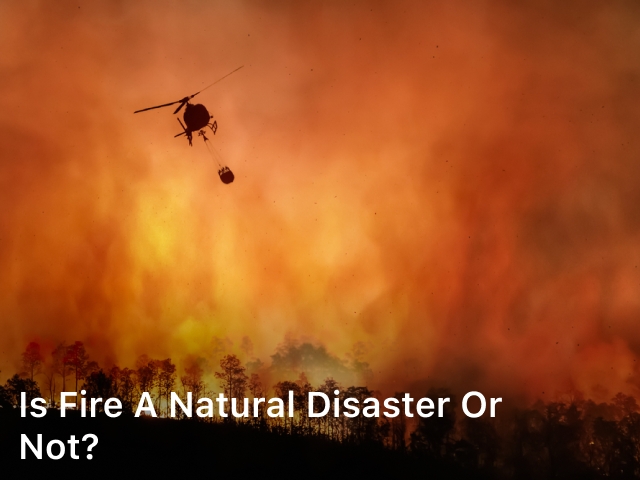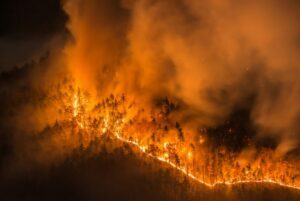Is Fire a Natural Disaster or Not?

Is Fire a Natural Disaster or Not? – Delve into our discussion as we explore the question, “Is fire a natural disaster?” Learn about wildfires, their triggers, and their impact on our environment.
As journalists, it is important for us to examine the question of whether fire can be considered a natural disaster. Some may argue that fire is a natural process in certain ecosystems and therefore, should not be classified as a disaster.
However, others may argue that when fire exceeds normal levels and causes extensive damage, it meets the criteria of a natural disaster. In this section, we will explore different perspectives on this topic and provide a thorough analysis to determine whether fire is, in fact, a natural disaster.
Key Takeaways:
- Examining whether fire can be considered a natural disaster
- Exploring the definition of natural disasters and their characteristics
- Analyzing wildfires, their causes, and environmental impacts
- Presenting different perspectives on fire as a natural disaster
- Concluding whether fire should be classified as a natural disaster
Understanding Natural Disasters
As journalists, we must have a clear understanding of what constitutes a natural disaster before we can determine whether fire belongs in this category. Natural disasters are events or phenomena that occur naturally and cause widespread damage or loss of life.
These can be caused by geological, hydrological, meteorological, and biological factors, and can affect both human and natural environments. Some examples of natural disasters include hurricanes, earthquakes, tornadoes, floods, landslides, and droughts.
To qualify as a natural disaster, an event must meet certain criteria. Firstly, it must be a result of natural causes and not human actions. Secondly, it must have a significant impact on human lives, property, or the environment. Lastly, it must happen within a short period of time, usually within 24 hours.
These characteristics differentiate natural disasters from other types of events, such as climate change, which occur over a longer time frame and may involve human factors.

Wildfires: Triggers and Impacts
Wildfires are a devastating type of fire that occur in natural environments. These fires are triggered by a combination of natural and human factors. Lightning strikes, high temperatures, drought conditions, and human activities such as arson, campfires, and cigarettes are some of the triggers that can result in wildfires.
Once a wildfire is ignited, it can have severe impacts on the environment and the economy. The damage caused by wildfires can be enormous, with impacts that are felt for years after the flames are extinguished.
The ecological impacts of wildfires are vast, with the destruction of habitats, loss of biodiversity, and soil erosion among the most severe effects. The air pollution created by wildfires can cause respiratory illnesses, while the ash and soot left behind can contaminate water resources.
The economic impacts of wildfire are equally significant. Homes, buildings, and infrastructure can be destroyed, leading to billions of dollars in property damage and the displacement of thousands of people. The cost of fighting wildfires can be staggering, with firefighting efforts costing billions of dollars each year.
Preventing wildfires is crucial for protecting the environment, economy, and human lives. Measures such as controlled burns, reducing fuel loads, and improving firefighting techniques can help prevent wildfires from starting or limit their spread. Early detection and rapid response to wildfires are also essential for minimizing their impacts.
In conclusion, the triggers and impacts of wildfires make them a natural disaster that cannot be ignored. By understanding the causes of wildfires and their effects on the environment and economy, we can work towards preventing and mitigating their destructive effects.
Perspectives on Fire as a Natural Disaster
There is ongoing debate on whether fire should be classified as a natural disaster. Some argue that fire is a natural occurrence and therefore not a disaster, while others contend that the destructive impacts of wildfires justify classifying them as natural disasters.
“Fire is an essential part of many ecosystems, and many plant species have evolved to depend on it for reproduction and growth. Therefore, it cannot be considered a natural disaster.”
This argument stresses the importance of fire in maintaining certain ecosystems. Some species, such as the lodgepole pine, require the heat of a fire to release their seeds and regenerate. Additionally, many ecosystems have adapted to frequent fires, which help to clear out dead or invasive plant species and promote new growth.
“While fire is a natural occurrence, the extreme wildfires that we are experiencing today are the result of climate change and human activities. These events are causing significant harm to the environment and human communities, justifying their classification as natural disasters.”
This counterargument highlights the human-caused factors that contribute to the severity and frequency of wildfires. Climate change has led to drier and hotter conditions, exacerbating the risk of wildfires.
Additionally, human activities, such as logging and building homes in high-risk areas, can lead to the ignition and spread of wildfires. These factors have contributed to the growing intensity and destructive power of wildfires, justifying their classification as natural disasters.
Ultimately, the classification of fire as a natural disaster depends on one’s perspective. However, it is important to recognize the significant impacts of wildfires on the environment, economy, and human lives. By acknowledging fire as a natural disaster, we can prioritize prevention and mitigation measures to reduce their destructive effects.
How is fire a disaster?
Fire can be considered a disaster for several reasons:
- Destruction of Property: Fires can rapidly engulf buildings, homes, and other structures, causing extensive damage or complete destruction. This leads to the loss of valuable assets and places a significant financial burden on individuals and communities.
- Loss of Life: One of the most tragic aspects of fires is the loss of human life. Fires can spread quickly, trapping people inside buildings or homes, making it difficult for them to escape. Smoke inhalation and burns are common causes of fatalities during fires.
- Environmental Impact: Fires can have a severe impact on the environment. They can destroy forests, grasslands, and wildlife habitats, leading to long-term ecological consequences. The release of smoke and pollutants into the atmosphere can also contribute to air pollution and harm air quality.
- Displacement of Communities: When fires threaten populated areas, residents often have to evacuate their homes, leading to the displacement of entire communities. This displacement can disrupt lives, strain emergency resources, and create challenges for those affected.
- Economic Costs: Fire disasters result in significant economic costs, including the expenses associated with firefighting efforts, property damage, insurance claims, and the long-term recovery of affected areas. These costs can be a burden on individuals, businesses, and governments.
- Health Risks: Fires release harmful pollutants and toxins into the air, which can pose serious health risks to people in the vicinity. Smoke inhalation can lead to respiratory problems, exacerbate existing health conditions, and have long-term health consequences.
- Infrastructure Damage: Fires can damage critical infrastructure such as power lines, water supply systems, and transportation networks. This can disrupt essential services, making it difficult for emergency responders to combat the fire and for affected communities to recover.
- Emotional and Psychological Impact: Fire disasters can have a profound emotional and psychological impact on survivors. Witnessing the loss of homes, possessions, and even loved ones can lead to trauma, anxiety, and long-lasting emotional scars.
- Wildfires: Wildfires, in particular, can spread rapidly and cover vast areas, often with devastating consequences. They can be challenging to control, especially in remote or rugged terrain, and can pose a threat to both human and animal populations.
- Climate Change: In recent years, wildfires have become more frequent and severe, partly due to climate change. Rising temperatures, prolonged droughts, and changing weather patterns contribute to the increased risk of fire disasters, making them a significant concern for global climate resilience.
In summary, fire disasters are a serious threat to human life, property, and the environment. Their far-reaching consequences, from immediate destruction to long-term impacts, make them a significant challenge for emergency responders, communities, and society as a whole.
Conclusion
After examining the various aspects of fire as a natural disaster, we can confidently conclude that fire can indeed be considered a natural disaster. Although fire is a natural process in some ecosystems, when it exceeds normal levels and causes extensive damage, it meets the criteria of a natural disaster.
Wildfires, in particular, are a major cause of concern due to their ecological, environmental, and economic impacts. They can destroy habitats, increase air pollution, and lead to the loss of biodiversity.
Additionally, wildfires can also threaten human lives, damage infrastructure, and cause significant economic losses. By acknowledging fire as a natural disaster, we can emphasize the importance of prevention, mitigation, and preparedness measures to reduce its destructive effects.
It is crucial that we take steps to manage and reduce the risks of wildfires, such as implementing fire safety regulations, improving fire suppression techniques, and promoting public awareness.
In conclusion, recognizing fire as a natural disaster is essential for effective planning and response to this phenomenon. By working together, we can minimize the negative effects of fires and ensure a safer, more sustainable future for ourselves and the planet.
FAQ
Q: Is fire considered a natural disaster?
A: Yes, fire is considered a natural disaster. While fire is a natural process in some ecosystems, when it exceeds normal levels and causes extensive damage, it meets the criteria of a natural disaster.
Q: What are some examples of natural disasters?
A: Examples of natural disasters include hurricanes, earthquakes, floods, and wildfires.
Q: What triggers wildfires?
A: Wildfires can be triggered by various factors, including lightning strikes, human activities, and drought conditions.
Q: What are the impacts of wildfires?
A: Wildfires can have significant ecological and environmental impacts, including the destruction of habitats, air pollution, and loss of biodiversity.
Q: Why do some people argue against classifying fire as a natural disaster?
A: Some argue that fire is a natural process and an essential part of certain ecosystems. They believe that categorizing fire as a natural disaster undermines its ecological role.





